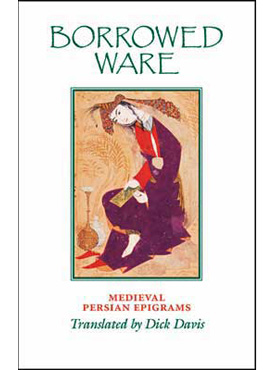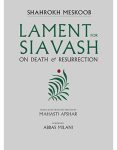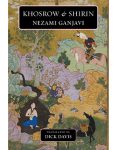About the Book
In Borrowed Ware, poet and translator Dick Davis brings together a collection of epigrams by poets from the “classic” period of Persian literature. It makes a fascinating introduction to a literature that is little known in the West, and incidentally provides insight into a vanished and extraordinary way of life. Davis’s prodigious scholarship of Persian poetry has enabled him to select a wide range of poems, from both famous and little-known poets. The result is some of the best English translations of Persian poetry ever. Davis has maintained exceptional faithfulness to the original Persian while recasting the poems’ grace and drive in English. The book also contains a lucid and entertaining introduction, and informative notes on each of the sixty-eight poets whose work is included. Each poem is faced by the text in delicate Persian nasta’liq calligraphy by Amir Hossein Tabnak.
Reviews
The Independent: “Dick Davis’s translation of the best of Persia’s medieval short poetry, borrowed ware, is a wonderful book, suffused with love, beautifully produced and with a comprehensive introduction to Persian courtly poetry.”
The Atlantic Monthly: “Mr. Davis has put what he called “Medieval Persian Epigrams” into easy, idiomatic English and provided an engaging introduction to the Persian world and an explanation of the code words that might otherwise puzzle modern readers. These authors were court poets, highly valued and well rewarded for wit, elegance, and a light touch. Originality of theme was not necessary, but there are surprises among the lovers’ laments and financial complaints. Jahan Khatun, one of the few women poets, considered erotic reform but decided to “renounce renumerations.” (A contemporary accused her of being a prostitute, but Mr. Davis points out that he “said this kind of thing” about everybody.) The poems are faced by versions in Persian scripts, making the collection pretty as well as amusing.”
Times Literary Supplement: “Many of the best poems in borrowed ware are mystical, and Davis is probably the first translator to have succeeded in conveying their intensity of focus. . . . Anyone doubting Davis’s own mastery of [poetry] should turn to borrowed ware. This anthology is the most personal of Davis’s excellent translations from the Persian. . . . Here, as in Western poetry of a similar period, the subjects are mostly religious and amorous, with some politics thrown in and a good deal of flattery for patrons. Yet these subjects, through their tone and imagery, invite into the book the whole range of that far-off culture’s concerns.”
Poetry Book Society Bulletin: “Some of the best known Persian poets–Rudaki, Sa’di, Rumi, Hafez-are included in this book, but its virtue is that it has cast its net widely over a fascinating variety of writers from the tenth century to the seventeenth. . . . The epigrams are erotic, religious, and political (sometimes all three together!), and their tone sweeps from the tender to the scabrous, from the bitchy to the mystical.”
Kirkus Reviews: “Whatever these short and witty epigrams sound like in their original language–which is included here for those who can read such calligraphy!–they are delightful as re-created in English by Davis, a poet and professor of Persian. All drawn from the classic period of Persian poetry (the 10th through 16th centuries), these public and formal poems–whether capturing a moment’s mood or praising a courtier–come alive in Davis’s scrupulous translations, invigorated with a user-friendly scholarly apparatus.”
Excerpt
- You want proof I’m not just a
- pampered brat?
- You’ve no idea of what it is I do?
- Bring me a horse, a bow,
- a book, some poems,
- A pen, a lute, dice, wine, a chess set too.
A Note on the Text
The texts for the poems translated here are taken from the following books:
Ganj-e Sokhan, ed. Zabihollah Safa, 3 vols., Tehran, n.d.
Tarikh-e Adabiyat dar Iran, ed. Zabihollah Safa, 5 vols., Tehran,
reprinted 1366/1987
Hezar Sal She’r-e Parsi, ed. Ja’far Ebrahimi et al., Tehran,
1365/1986
Nozhat al-Majales, ed. Mohammad Amin Riahi, Tehran,
1366/1987
Pishahangan-e She’r-e Parsi, ed. Mohammad Dabirsiaqi, Tehran
2536/1978
Kolliyat-e Eraqi, ed. Sa’id Nafisi, Tehran, n.d.
Divan-e Onsori-ye Balkhi, ed. Mohammad Dabirsiaqi, Tehran,
1363/1984
Sokhanan-e Manzoum-e Abu Sa’id Abul Khayr, ed. Sa’id Nafisi,
Tehran, n.d.
Kolliyat-e Sa’di, ed. Mohammad Ali Foroughi et al., Tehran, n.d.
Kolliyat-e Obayd-e Zakani, ed. Parviz Atabeki, Tehran,
1343/1964
Divan-e Qatran-e Tabriz, ed. Hasan Taqizadeh et al., Tehran,
1362/1983
Divan-e Anvari, ed. Sa’id Nafisi, Tehran, 1364/1985
Kolliyat-e Divan-e Shams-e Tabrizi, ed. Badi’alzaman Forouzan far et al., Tehran, 1351/1972
Divan-e Vahshi-ye Bafeghi, ed. Hosayn Nakha’i, Tehran,
1366/1987
Divan-e Mas’ud-e Sa’d, 2 vols., ed. Mehdi Nuryan, Esfahan,
1365/1986
Divan-e Kh’ajeh Hafez-e Shirazi, ed. Seyyed Abu’l Qasem Anjavi-Shirazi, Tehran, 1346/1967.
In preparing the brief notes on individual poets my chief debt is to Dr. Zabihollah Safa’s Tarikh-e Adabiyat dar Iran (‘History of Literature in Iran’, 5 vols., Tehran, reprinted 1366/1987). I have also made use of Dr. Mohammad Amin Riahi’s introduction to his edition of the 14th-century anthology of rubaiyat, the Nozhat al-Majales (“Pleasure of the Assemblies”), as well as using material from other sources.
About the Translator
Dick Davis brings a unique array of gifts to the challenges of translating Hafez and his contemporaries. In his own right, he is a poet of great technical accomplishment and emotional depth. He is also the foremost English-speaking scholar of medieval Persian poetry now working in the West. Numerous honors testify to his talents. In the U.K., he received the Royal Society of Literature’s Heinemann Award for his second book of poems, Seeing the World, in 1981; his Selected Poems was chosen by both the Sunday Times and the Daily Telegraph as a Book of the Year in 1989; and his collection Belonging was selected as the Poetry Book of the Year by The Economist in 2003. In the U.S., A Kind of Love—the American edition of his Selected Poems—received the Ingram Merrill prize for “excellence in poetry” in 1993. He has received awards for his scholarship from the Arts Council of Great Britain, The British Institute of Persian Studies, and the Guggenheim Foundation, and he is the recipient of grants for his translations from the National Endowment for the Humanities and the National Endowment for the Arts. Twice, in 2000 and 2001, he received the Translation Award of the International Society for Iranian Studies, and in 2001 he received an Encyclopedia Iranica award for “services to Persian poetry.” His translation of Ferdowsi’s Shahnameh: the Persian Book of Kings was chosen as one of the “ten best books of 2006” by the Washington Post.
Davis read English at Cambridge, lived in Iran for eight years (he met and married his Iranian wife Afkham Darbandi there), then completed a PhD in Medieval Persian Literature at the University of Manchester. He has resided for extended periods in both Greece and Italy (his translations include works from Italian), and has taught at both the University of California and at Ohio State University, where he was for nine years Professor of Persian and Chair of the Department of Near Eastern Languages, retiring from that position in 2012. In all, he has published more than twenty books and is a Fellow of the Royal Society of Literature.
Among the qualities that distinguish his poetry and scholarship are exacting technical expertise and wide cultural sympathy—an ability to enter into distant cultural milieus both intellectually and emotionally. In choosing his volume of poems Belonging as a “Book of the Year” for 2006, The Economist praised it as “a profound and beautiful collection” that gave evidence of “a commitment to an ideal of civilized life shared by many cultures.” the Times Literary Supplement has called him “our finest translator of Persian poetry.” In 2009 Mage published a book of Dick Davis’s own poems about Iran: At Home and Far From Home: Poems on Iran and Persian Culture. His book about the Shahnameh, Epic and Sedition was published by Mage in paperback in 2006. His books of translations are: Borrowed Ware: Medieval Persian Epigrams (1998), The Shahnameh (2004); The Legend of Seyavash (2004); Rostam: Tales of Love and War from Persia’s Book of Kings (2007); Vis and Ramin (2008); Faces of Love: Hafez and the Poets of Shiraz (2012).








